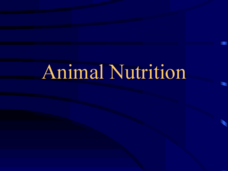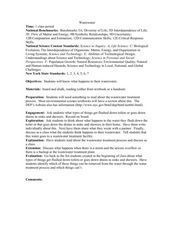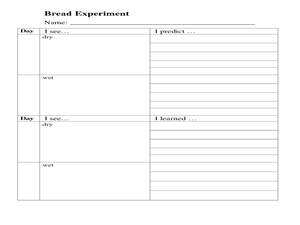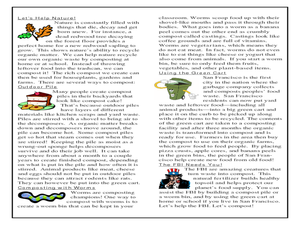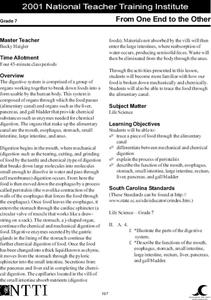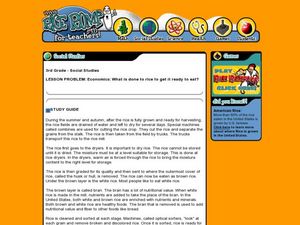Curated OER
What Do Trees Do for Dinner?
Students investigate how trees produce their own food. They examine chlorophyll cells with a microscope, analyze a cross section of a log, determine how old the tree was, simulate the distance of the roots, and create a play.
Curated OER
Pollination
Fourth graders explore the pollination process. In this plant biology lesson, 4th graders dissect a flower to identify the parts of a flower and watch a video to see seed dispersal. Students write about the pollination process.
Curated OER
Animal Nutrition
Use this great overview to give information on all aspects of nutrition. By working their way through this PowerPoint, students review a lot of information about the digestive process. Students read many facts on a number of detailed...
Curated OER
Digestion and Nutrition
Debunk the theory that a soda-and-candy diet is a nutritionally sound concept! Learners first read 2 paragraphs of background information covering essential nutrients, digestion, and homeostasis. Then, they use the information they...
Curated OER
De"compost"ition
Students develop an understanding of the decomposition process and the parameters which influence the rate at which it occurs.
Curated OER
Wastewater
High schoolers discuss what happens to their wastewater. They read about the wastewater treatment process. Students are asked what types of things get flushed down toilets or goes down drains in sinks and showers. They are taught what...
Curated OER
Everything's Connected
Students explore how trash decomposes. In this ecosystem lesson, students discuss new vocabulary words, such as producers and consumers, and think critically to answer how landfills work.
Curated OER
Cell Structures and Functions
Fifth graders search into animal and cell characteristics and their functions in this seven lesson unit. Replicas of the cell are constructed out of Jell-O as students probe the internet for details of the concepts.
Curated OER
Root, Root, Root for the Nutrients
Students observe the growth of a seed, predict what will happen when seeds are planted without soil, and conduct an experiment using a hydroponics system.
Cornell University
Bacteria Take Over and Down
Bacteria outnumber all other forms of life on Earth. Scholars observe the growth of bacteria in petri dishes to understand their role in maintaining good health. Then, they observe the growth of bacteria after they introduce...
Curated OER
Toward a Sustainable Agriculture
Your class considers a case study of a sustainable agro-ecosystem and view a PowerPoint presentation about a sustainable farm. They complete a case study worksheet. Extension activities are included.
Curated OER
The Compost Bucket
Students recognize that plants and soils have a close relationship. They view a photo essay on the common practice and natural process of composting. Afterwards, they observe the process of plant decay over the course of several days.
Curated OER
S-O-I-L Soil
Fifth graders research soil, its nutrients, and plant growth. In this soil lesson, 5th graders create soil journals, trace flowers, and include nutrient information on each petal. Students read an excerpt from "McBroom Tells the Truth."...
Curated OER
The Human Organism
In this digestion and nutrition lesson, 3rd graders test foods to find their vitamin content. Students test for starch and fats then compare their findings on charts and oral reports. The lesson concludes with a teacher directed class...
Curated OER
Forest Decomposition
Students explore decomposition. Students define and describe components of the decomposition process. Students make a composter in a terrarium. Students record observations and changes weekly, drawing conclusions about the results of...
Curated OER
Eutrophication Experiments
Observe two different water samples and write down observations. Write a paragraph which predicts the relative amounts of nutrients, nitrates, and phosphates in the water samples. Compare water samples under a microscope.
Curated OER
Mighty Oaks from Little Acorns
What does it mean to grow? To germinate? For the plan detailed here, class members investigate the growth process of an oak tree while focusing on the beginning stages of planting and germination. They plant seeds and record observations...
Curated OER
Eutrophication Lab
Young scholars examine the effects of detergents and fertilizers on aquatic life and describe algae. Students define the term eutrophication as the process by which a body of water, such as a pond, lake, stream, or river, has a sudden...
Curated OER
Let's Build a Worm Bin
Learners explore the process of decomposition. In this ecology and measurement instructional activity, students prepare a worm home to be used for vermicomposting. Learners weigh a group of worms and the added food, recording this...
Curated OER
Trophic Ecology of Humans
students analyze the place of humans among the tropic levels by observing what we eat. They calculate the caloric content of several foods commonly eaten by humans and calculate the total energy cost to grow, process, transport, store...
Curated OER
From One End to the Other
Seventh graders trace a piece of food through the digestive system. They describe the functions of the mouth, esophagus, stomach, etc.
Curated OER
From One End to the Other
Seventh graders trace a piece of food through the alimentary canal and differentiate between mechanical and chemical digestion in several different hands-on activities related to digestion.
Curated OER
Economics: What is done to rice to get it ready to eat?
Third graders create a map showing the journey of rice from the field to the grocery store. In this agriculture lesson, 3rd graders discover and map the process of harvesting and preparing rice to be packaged and shipped to sell to...
Curated OER
Worm Composting
Second graders discuss worm composting. In this decomposition lesson, 2nd graders look at the anatomy of the worm and how it eats food. They have their own worm bin and review what foods can and can not be given to the worms for...




